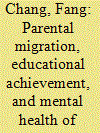|
|
|
Sort Order |
|
|
|
Items / Page
|
|
|
|
|
|
|
| Srl | Item |
| 1 |
ID:
187849


|
|
|
|
|
| Summary/Abstract |
The long-term effects of adverse childhood experiences (ACEs) negatively affect health, well-being, and life outcomes. We make use of a unique data set of survey responses from Chinese inmates to identify specific correlates of ACEs, measured by emotional abuse, emotional neglect, physical abuse, and childhood bullying. We find that having a troubled friend during childhood, parental alcohol use, and parental absence are positively correlated with all four measures of childhood trauma. In addition, an inmate's educational attainment has a strong relationship with self-reported trauma. Our data allow us to examine the relationships between life circumstances and ACEs for prison inmates, a group of people with poor life outcomes, thus providing direction for policy interventions.
|
|
|
|
|
|
|
|
|
|
|
|
|
|
|
|
| 2 |
ID:
170104


|
|
|
|
|
| Summary/Abstract |
China's rapid development has led to an unprecedented increase in migration rates as an ever-growing number of rural residents migrate to urban areas to seek better job opportunities and help alleviate family poverty. Economic pressures and structural restrictions force many of these migrant workers to leave their children behind in their rural homes, which has led to the emergence and expansion of a new subpopulation in China: left-behind children (LBCs). This study examines the impacts of parental migration on the educational outcomes (specifically math achievement) and mental health (specifically anxiety) of LBCs using data covering 7495 children in a prefecture of Shaanxi Province (from three surveys conducted between 2012 and 2014). We distinguish between “both parents migrating,” “one parent migrating,” “only a father migrating,” and “only a mother migrating.” We also explore the impacts on male versus female LBCs. We find no significant impact of parental migration on the math achievement of LBCs. In terms of mental health, however, our results indicate that left-behind girls were negatively affected by one parent migrating, especially if the migrating parent was the father. The findings suggest that it may not be necessary for policy makers to design special programs to improve educational outcomes of LBCs in general. However, local committees, schools, and parents should pay particular attention to left-behind girls living with only one parent, as they may be more vulnerable to mental health problems than their peers.
|
|
|
|
|
|
|
|
|
|
|
|
|
|
|
|
|
|
|
|
|